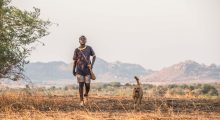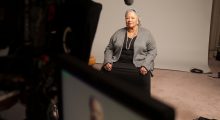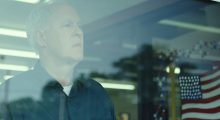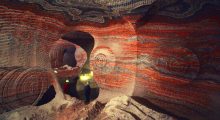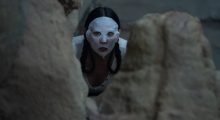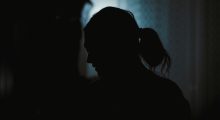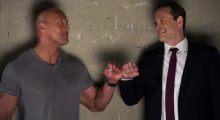Sundance Film Festival
-
“I Stayed in the Water for 10 Minutes, Risking Getting Frozen”: Director/DP Beniamino Barrese on The Disappearance of My Mother

Beniamino Barrese’s mother, Benedetta Barzini, was a famous Italian model from her discovery in 1963 to her retirement a decade later. Her photographers included Richard Avedon, and her career led her to spend time as part of Warhol’s Factory scene. Barrese’s The Disappearance of My Mother begins as Barzini tells her son she intends to disappear from the material world. Alarmed, Barrese’s response was to use the camera to both capture his mother and try to reconcile her tangled relationship with the power of imagery, acting as his own DP. Barrese answered questions via email about integrating 16 and 35mm and throwing […]
by Filmmaker Staff on Jan 30, 2019 -
“Teleportation Into the Rich Cultural Space of a Remarkable People”: Director Chiwetel Ejiofor | The Boy Who Harnessed The Wind

Whenever directors watch their own films, they always do so with the knowledge that there are moments that occurred during their production — whether that’s in the financing and development or shooting or post — that required incredible ingenuity, skill, planning or just plain luck, but whose difficulty is invisible to most spectators. These are the moments directors are often the most proud of, and that pride comes with the knowledge that no one on the outside could ever properly appreciate what went into them. So, we ask: “What hidden part of your film are you most privately proud of […]
by Filmmaker Staff on Jan 30, 2019 -
Editor Johanna Giebelhaus on Toni Morrison: The Pieces I Am

Drawing on his longtime friendship with the legendary novelist, photographer and documentarian Timothy Greenfield-Sanders’ Toni Morrison: The Pieces I Am paints a full, intimate portrait of her life and work. An assistant editor since 2000 whose first credit as an editor came in 2003, Johanna Giebelahus helped shape the copious material onhand. Via email, Giebelhaus spoke about the process of shaping a whole life into a documentary package. Filmmaker: How and why did you wind up being the editor of your film? What were the factors and attributes that led to your being hired for this job? Giebelhaus: Toni Morrison: The Pieces I Am is the […]
by Filmmaker Staff on Jan 30, 2019 -
“We Had Over 200 Special Effects”: Director Noble Jones | Tomorrow Man

Whenever directors watch their own films, they always do so with the knowledge that there are moments that occurred during their production — whether that’s in the financing and development or shooting or post — that required incredible ingenuity, skill, planning or just plain luck, but whose difficulty is invisible to most spectators. These are the moments directors are often the most proud of, and that pride comes with the knowledge that no one on the outside could ever properly appreciate what went into them. So, we ask: “What hidden part of your film are you most privately proud of […]
by Filmmaker Staff on Jan 30, 2019 -
“Filming in 44 Locations in 22 Countries on Six Continents”: DP Nicholas de Pencier on Anthropocene: The Human Epoch

DP Nicholas de Pencier has long collaborated with his wife, director Jennifer Baichwal, on her projects. One of their most acclaimed films, Manufactured Landscapes, was a profile of large-format landscape photographer (and fellow Canadian) Edward Burtynsky. Now, on Anthropocene: The Human Epoch, Burtynsky moves from subject to collaborator on a large project tackling nothing less than humanity’s impact on the planet. Filmed over four years, the project involved a great deal of travel, technical planning and risk; via email, de Pencier answered questions about his work on the ambitious documentary. Filmmaker: How and why did you wind up being the cinematographer of […]
by Filmmaker Staff on Jan 29, 2019 -
“We are Comfortable Treating Rushes as You Would Piecing Together a Doc”: Editor Bryan Mason on Animals

Australian editor and cinematographer Bryan Mason has collaborated with director Sophie Hyde before; their first was 52 Tuesdays, a mother-daughter drama in which the latter is transitioning genders. Adapted by Emma Jane Unsworth from her novel, Animals examines another kind of relationship at a moment of change, tracking two Dublin friends in their early 30s whose years of boozing and companionship are starting to be too much to handle. Also serving as the project’s DP, via email Mason discussed the challenges of editing a project with input coming from Australia, the UK and Ireland, getting lost in early edits, and reshaping the […]
by Filmmaker Staff on Jan 29, 2019 -
“We Had Less than Two Hours”: Creator, Writer and Star Danielle Uhlarik | Bootstrapped

Whenever directors watch their own films, they always do so with the knowledge that there are moments that occurred during their production — whether that’s in the financing and development or shooting or post — that required incredible ingenuity, skill, planning or just plain luck, but whose difficulty is invisible to most spectators. These are the moments directors are often the most proud of, and that pride comes with the knowledge that no one on the outside could ever properly appreciate what went into them. So, we ask: “What hidden part of your film are you most privately proud of […]
by Filmmaker Staff on Jan 29, 2019 -
“Creative Solutions for Blocking and Information”: Director Patrick Brice | Corporate Animals

Whenever directors watch their own films, they always do so with the knowledge that there are moments that occurred during their production — whether that’s in the financing and development or shooting or post — that required incredible ingenuity, skill, planning or just plain luck, but whose difficulty is invisible to most spectators. These are the moments directors are often the most proud of, and that pride comes with the knowledge that no one on the outside could ever properly appreciate what went into them. So, we ask: “What hidden part of your film are you most privately proud of […]
by Filmmaker Staff on Jan 29, 2019 -
Sundance Film Festival 2019: Cold Case Hammarskjöld, Light From Light

I’m not at Sundance this year but, thanks to a generous smattering of pre-screenings, still playing along from home. Of the six titles I saw in advance, I was most curious about what kind of reception Mads Brügger’s Cold Case Hammarskjöld would receive. Based on his first two films, I’d pegged Brügger as a sort of more self-serious Sacha Baron Cohen; both blur the lines between journalist and satirist, parachuting themselves into definitely nerve-wracking, potentially dangerous situations under false pretenses in service of (at least aspirationally) a larger social agenda. Both Brügger’s The Red Chapel and The Ambassador placed the undisguisably Danish-accented, seemingly unflappable director/”star” in, respectively, North […]
by Vadim Rizov on Jan 28, 2019 -
“There’s a Lot of Hidden Pipework Pumping Out Information”: Director Stephen Merchant | Fighting with my Family

Whenever directors watch their own films, they always do so with the knowledge that there are moments that occurred during their production — whether that’s in the financing and development or shooting or post — that required incredible ingenuity, skill, planning or just plain luck, but whose difficulty is invisible to most spectators. These are the moments directors are often the most proud of, and that pride comes with the knowledge that no one on the outside could ever properly appreciate what went into them. So, we ask: “What hidden part of your film are you most privately proud of […]
by Filmmaker Staff on Jan 28, 2019

